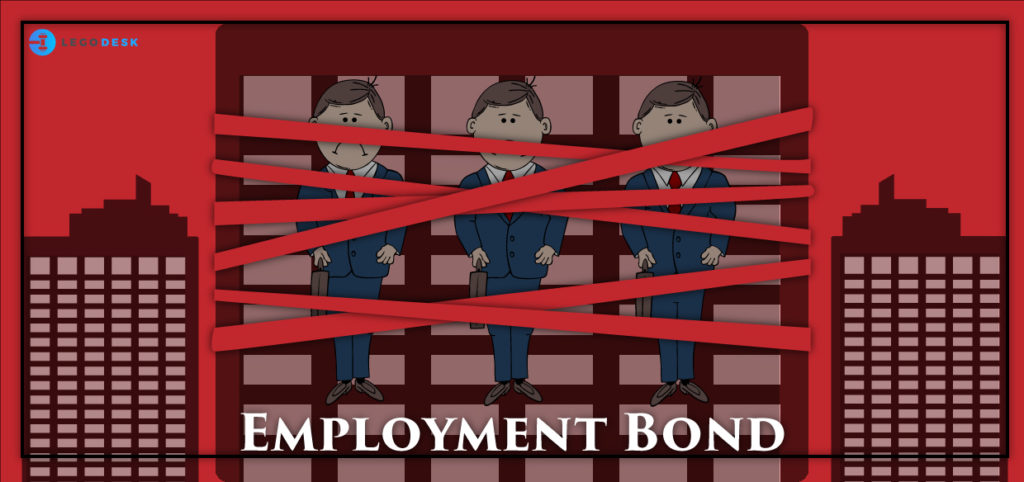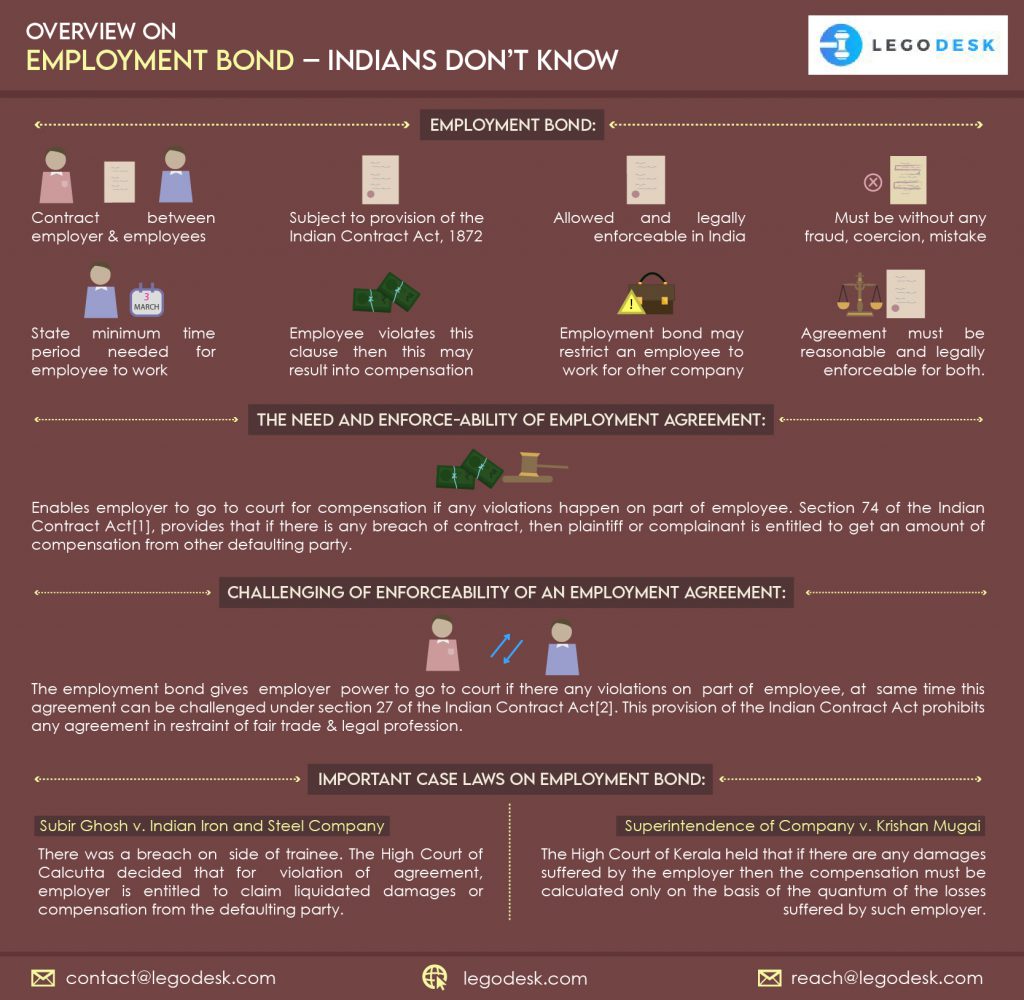Overview on Employment Bond – Indians Don’t Know

Introduction
With the process of civilization, the economy and industrial process have changed a lot and this resulted in greater business competition in the market. To keep balance with the process and cope up with the completion in the market industries, companies have adopted several methods to promote their business efficiently. On the other hand, employees often leave their company after a certain period of time and after gaining their skills and knowledge in a particular field of an area to get better benefits from other new companies. This process leads companies with financial losses. For this purpose, to protect the interest and goodwill of the company, the employment bonds were needed to be introduced. But the employment bond not only protects the interest of the employer but also those of the employees.
Read Also: Non-Compete Clause in Employment Agreement
Employment Bond
Employment bond is generally a contract between the employer and employees, and hence subject to the provision of the Indian Contract Act, 1872. It is an employment bond with a negative covenant. Employment agreements are generally allowed and legally enforceable in India under various Indian Laws if both the parties to the agreements give their free consent to it without any fraud, coercion, mistake, undue influence, and misrepresentation. Also, the agreement must be reasonable and legally enforceable. An employment bond generally consists of clauses which state the minimum time period needed for the employee to work for the company and if any employee violates this clause then this may result into compensation which has to be paid by the employee to the company or employer. Also, an employment bond may restrict an employee to work for any other company while he/she is working for a particular organization or company.

The need and enforce-ability of Employment Agreement
The employment bond generally sets a time period for the employee to work for an organization and if any employees avoid this agreement, then there are legal consequences for that breach also. This bond generally comes with some benefits for the employer or organization if any above-mentioned situations arise. It enables the employer to go to court for the compensation if any violations happen on the part of the employee. Section 74 of the Indian Contract Act[1], provides that if there is any breach of contract, then the plaintiff or complainant is entitled to get an amount of compensation from the other defaulting party. In the case of employment bond, the employee is generally the defaulting party who leaves any company before the time period mention in the agreement.
Challenging of enforceability of an Employment Agreement
While the employment bond gives the employer the power to go to court if there any violations on the part of the employee, at the same time this agreement can be challenged under section 27 of the Indian Contract Act[2]. This provision of the Indian Contract Act prohibits any agreement in restraint of fair trade and the legal profession. As per this section, if any agreement, directly or indirectly, restricts someone from a fair trade and lawful profession, then it is void. Article 19(1)(g)[3] of the Indian Constitution also gives rights to exercise a lawful profession, trade and business. For an employment bond to be valid in India, it must not in contrast with the above-mentioned provisions and also should be reasonable in nature. There should be freedom of trade and fair practices with regard to lawfully valid professions.
Read Also – Handling Employment Disputes Effectively—What Employers Should Know
Important Case Laws on Employment Bond
- Subir Ghosh v. Indian Iron and Steel Company[4]
This case was decided by the Calcutta High Court on the scope of Section 27 and Section 74of the Indian Contract Act. This case was in the context of a trainee. There was an employment bond which contained a proviso to serve the organization for a said period of time and to pay compensation if there is any breach on the said clause. There was a breach on the side of the trainee. The High Court of Calcutta decided that for the violation of the agreement, the employer is entitled to claim liquidated damages or compensation from the defaulting party.
- Superintendence of Company v. Krishan Mugai[5]
In this case, it was held by the court that, if an agreement restricts trade for a party in a future event to carry on a trade then such nature agreement is prima facie void.
In the case of Fertiliser and Chemical Travancore Pvt. Ltd v. Ajay Kumar and Others[6], the High Court of Kerala held that if there are any damages suffered by the employer then the compensation must be calculated only on the basis of the quantum of the losses suffered by such employer.
Conclusion
The employment bond is considered to protect the interest of the employer. But it also looks after the situation of the employee also. In this regard, many Courts found that this agreement must be reasonable in nature to safeguard both sides at the same time without causing any injustice to any party. And in the case of a breach of the agreement, the compensation needs to be reasonable and proportionate to the damage caused to the employer.
[1] The Indian Contract Act 1872, s 74
[2] Ibid s 27
[3] The Constitution of India, Article 19(1)(g)
[4] Subir Ghosh v. Indian Iron and Steel Company (1977) IILLJ 120 Cal
[5] Superintendence of Company v. Krishan Mugai AIR 1980 SC 1717
[6] Fertiliser and Chemical Travancore Pvt. Ltd v. Ajay Kumar and Others 1990 LLR 771
Try our Debt Resolution solutions today Request a Demo